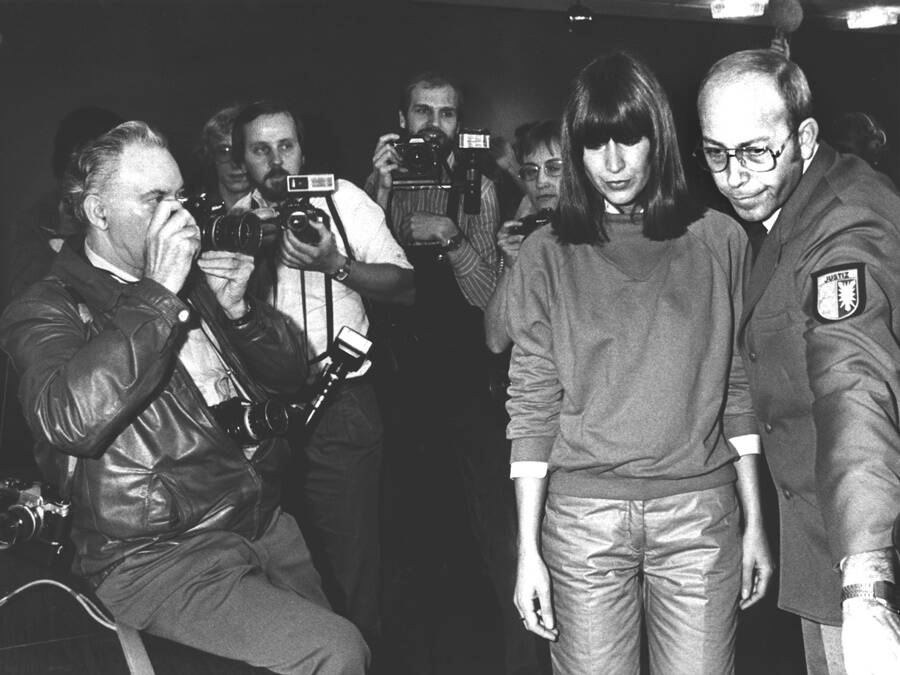Could a mother's grief and rage justify an act of violence within the hallowed halls of justice? In the spring of 1981, in a courtroom in Lbeck, West Germany, Marianne Bachmeier took the law into her own hands, forever etching her name into the annals of legal history.
The case of Marianne Bachmeier, a West German woman who killed the man accused of murdering her daughter, Klaus Grabowski, is a stark reminder of the complex interplay between law, morality, and the raw power of human emotion. Her actions, a desperate act of retribution, ignited a firestorm of debate that continues to simmer to this day, forcing society to confront uncomfortable truths about justice, vengeance, and the limits of forgiveness. The events unfolded on March 6, 1981, during the trial of Klaus Grabowski, who was accused of the rape and murder of Bachmeier's seven-year-old daughter, Anna. What followed was a moment of unparalleled drama that would forever define Bachmeier's life and legacy.
| Full Name | Marianne Bachmeier (ne Perske) |
| Date of Birth | June 3, 1950 (some sources state September 1950) |
| Place of Birth | Sarstedt, Germany (some sources state Lbeck, Germany) |
| Date of Death | September 17, 1996 |
| Place of Death | Lbeck, Germany |
| Known For | Killing Klaus Grabowski, the man accused of murdering her daughter, Anna |
| Occupation | Waitress |
| Children | Anna Bachmeier (murdered) |
| Legal Consequences | Convicted of manslaughter; served three years in prison |
| Controversy | Sparked intense debate on vigilante justice, morality, and the legal system. |
| Related Events | The murder of Anna Bachmeier, the trial of Klaus Grabowski, the shooting of Grabowski by Marianne Bachmeier. |
| Key Locations | Lbeck, Sarstedt, Germany. |
Marianne Bachmeier's life, and the events that led to her actions in the courtroom, were marked by a series of hardships. She was born in Sarstedt, Germany, in 1950, to parents who later divorced. Her relationship with her mother and stepfather was strained, adding to the instability of her early years. She was a young, single mother to Anna, born in November 1972. The "bohemian" lifestyle she adopted at the time was a stark contrast to the conventional norms of the era, a reflection of her own search for identity and independence. These early experiences undoubtedly shaped her perspective and her future actions.
- Did Kendrick Lamar Play Basketball Exploring The Truth Behind The Mic And The Court
- How Is Sulphur Soap The Ultimate Guide To Understanding Its Benefits And Uses
The murder of her daughter, Anna, was a devastating blow, a tragedy that pushed Bachmeier to the edge. In 1980, Anna was abducted, raped and murdered. The prime suspect was Klaus Grabowski, a butcher. In the ensuing legal proceedings, Bachmeier was confronted with the agonizing details of her daughters death. The courtroom became a battleground, not only for the legal arguments but also for the raw emotions of a mother grappling with unimaginable loss. Her decision to take matters into her own hands was a dramatic culmination of her grief, anger, and the perceived inadequacy of the legal system to provide true justice for her daughter. Witnesses at the scene later claimed to have heard her state she wanted to kill Grabowski, and it's been documented that she shot him multiple times.
On March 6, 1981, during the trial of Klaus Grabowski in the Lbeck district court, Bachmeier smuggled a Beretta 70 pistol into the courtroom. As Grabowski sat facing the charges against him, Bachmeier, in a moment of shocking defiance, raised the gun and fired eight shots at the man. Six of those bullets found their mark. The courtroom erupted in chaos. This singular act of violence transformed Bachmeier from a grieving mother into a defendant, sparking a national and international debate. The trial and its aftermath became a media sensation, with news crews from around the world descending on Lbeck to cover the proceedings.
The legal aftermath of Bachmeiers actions was complex. Initially charged with murder, the charges were later reduced to manslaughter. This reduction reflected, to some extent, the understanding of her emotional state. She was convicted of manslaughter and sentenced to six years in prison. In this, the court recognized the mitigating circumstances, but also acknowledged the gravity of her crime. Bachmeier ultimately served three years of her sentence before being released. After prison, she relocated to Nigeria and Sicily, seeking to escape the constant scrutiny and media attention. The shadow of the event followed her until her death from cancer in Lbeck in 1996.
- Gravity Falls Mcdonalds The Ultimate Fan Guide To This Iconic Crossover
- How To Say Tamales In Nahuatl A Fascinating Dive Into Indigenous Cuisine And Language
The case of Marianne Bachmeier is a potent reminder of the limitations of the legal system and the complexities of human emotion. The shooting in the courtroom raised fundamental questions about the nature of justice. Was Bachmeier a vigilante, taking the law into her own hands? Or was she a grieving mother, driven to the edge by unbearable pain and a desire for retribution? The answers to these questions remain elusive, and it is the lack of easy answers that keeps her story so compelling. This case highlighted the challenges faced by the legal system in balancing the needs of victims, the rights of the accused, and the pursuit of justice.
The impact of Bachmeier's actions resonated far beyond the confines of the courtroom. Her story quickly became a cultural touchstone, prompting extensive discussions about morality, revenge, and the role of the legal system in society. Numerous books, documentaries, and films have explored her story, each offering different perspectives on her motives and the implications of her actions. The case continues to be referenced in legal and ethical discussions, serving as a cautionary tale about the potential consequences of vigilante justice. Her actions in Lbeck continue to stir debate and reflection about the boundaries of law and the immense burdens of grief.
The case also underscored the intense emotional toll that violent crime takes on victims' families. In the aftermath of Anna's murder and the subsequent trial, Bachmeier faced a unique set of challenges. The constant media scrutiny, public judgment, and legal proceedings created an environment of ongoing trauma. Her actions, though extreme, can be viewed as a desperate attempt to regain some sense of control in a situation where she felt completely powerless. Understanding the emotional landscape that surrounded Bachmeier is essential to grasping the complexities of her actions.
The case became known as "Der Fall Bachmeier", a German phrase that signifies the weight and importance of her story. The case has been the subject of numerous television programs and documentaries that tried to reconstruct the events and analyze the motivations and emotions of Marianne Bachmeier and others. The coverage surrounding the case also helped to highlight the broader issues of the treatment of victims, the role of media in the courtroom, and the varying concepts of justice in a modern society. The case's lasting impact speaks to its ability to capture public attention and spark critical debate.
Ultimately, the story of Marianne Bachmeier is a cautionary tale about the human condition. It's a story about loss, grief, and the limits of law and order. It raises challenging questions about the nature of justice and the role of revenge. It forces us to confront the complexities of human emotion and the potential consequences when those emotions intersect with the legal system. The legacy of Marianne Bachmeier continues to live on, as her actions and their impact continue to influence conversations about morality and justice long after her death.
- Surthycooks Net Worth The Untold Story Behind The Culinary Success
- Sofia La Casa De Los Famosos The Ultimate Guide To Her Fame Journey And Impact


